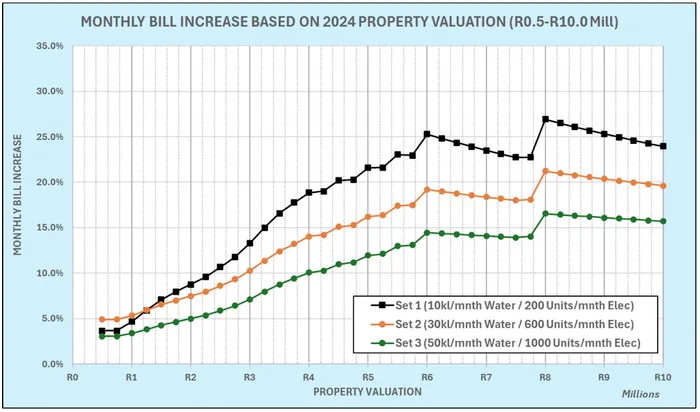Petition against City's proposed rate increases

The graph was taken from a thorough analysis conducted by Jon Lijnes, a Noordhoek resident.
Image: supplied
As the deadline for public participation on the City of Cape Town’s draft budget for 2025/2026 approaches on Friday May 2, the Noordhoek Ratepayers' Association (NRPA) is urging residents to sign a petition opposing the proposed budget.
The petition was initiated by the Cape Town Collective Ratepayers’ Association (CTCRA) — a coalition of more than 50 civic organisations.
It raises concerns over the City’s proposed shift to fixed monthly charges for essential services such as water, electricity, sanitation, and cleaning. These changes are not only seen as unfair but may also be legally questionable.
As previously reported by the Echo, both the NRPA and the Fish Hoek Valley Ratepayers’ and Residents’ Association (FHVRRA) raised the alarm earlier this month, warning that the budget’s structural changes could result in monthly increases of up to 30% for many households — especially those in properties valued above R3 million.
The NRPA is particularly concerned about the financial burden these increases will place on residents, especially pensioners and those already struggling with rising living costs.
The petition highlights several pressing concerns regarding the City of Cape Town’s proposed budget for 2025/2026:
Disproportionate increases: Many residents are projected to face rate increases of up to 30%, driven by higher property values. This sharp rise in costs is expected to disproportionately affect homeowners, particularly in the Far South.
Shift to property value-based charges: The CTCRA argues that the City’s move from usage-based billing to property value-based charges for essential services like electricity, water, sanitation, and cleaning is unjust. Residents who have made efforts to reduce their consumption, such as installing solar panels, are now being penalised with higher fees.
Solar households subsidising others: The City’s decision to cap electricity increases at just 2%, well below inflation, has sparked concern. This move means households that have invested in solar power are effectively subsidising the electricity consumption of others, a decision described by critics as inequitable.
Concerns over rising property values: The CTCRA also calls for a review of the City’s property valuation system. Many properties have seen significant increases in value in recent years, which, coupled with the proposed rate hikes, will result in higher future costs for residents.
Excessive budget increases: While infrastructure investment is important, many residents argue that the proposed 11.4% increase to the City’s budget is excessive. It follows similar hikes of 11.9% and 11.2% in 2024 and 2023, respectively, creating mounting financial strain, particularly for retirees and homeowners with single incomes.
Possible breach of the Municipal Systems Act: Critics of the budget have raised concerns that it violates parts of the Municipal Systems Act 2020. Specifically, they argue that linking tariffs to property values rather than actual service usage contradicts the Act’s principles of fairness and efficiency.
Environmental and fairness concerns with electricity charges: Another point of contention is the lowering of electricity charges to offset high property rates. Critics argue that this could encourage higher electricity consumption, exacerbating load-shedding risks and the City’s environmental footprint. Additionally, solar-powered households, which consume less energy, feel unfairly penalised by the high property charges.
Adjustment needed for property value threshold: The CTCRA proposes raising the property value threshold for the R435 000 rates exemption from R5 million to R6 million. This adjustment would provide relief to more residents, particularly those impacted by rising property values that are beyond their control.
To view and sign the petition, visit https://www.petitions.net/object_to_the_draft_2025-26_budget_for_cape_town
Residents can also check their estimated rate increases using the City’s online rates calculator.
Additionally, the City has an online platform where residents can submit their comments and feedback directly: Submit Feedback Link
Public participation on the draft budget will close on Friday May 2.